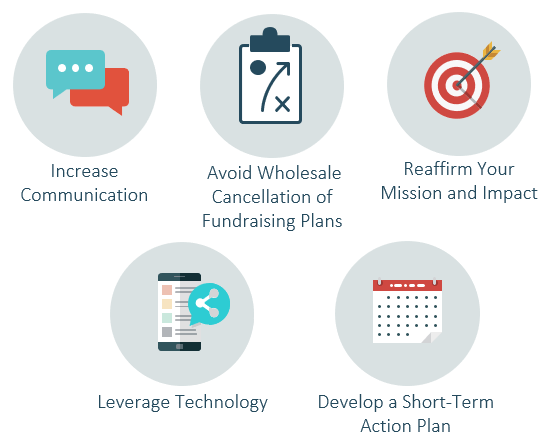If potential donors do not see the rare disease community as part of the front line in the battle against COVID-19, it might be a difficult time introduce them to your organization or ask them to consider making a gift. But because the pandemic has disrupted access to needed healthcare services, the rare disease community has been directly impacted by the current crisis. Even in the midst of current challenges, organizations need to develop a strategy to make up for lost fundraising opportunities in order to continue providing support to the individuals and families they serve.
COMMUNICATE THE DISRUPTION

It’s a critical time to communicate organizational needs to donors and prospects. Don’t be surprised if their response is more positive than you anticipated. The current health crisis and its economic impact have been so disruptive to our daily lives that many constituents desire to understand the effects on their favorite nonprofits.
Some organizations might feel they need to postpone communications while they resolve the challenges that affect their work. However, in times of uncertainty, volunteers, particularly board members need more information, even if it is to explain that some organizational functions will remain on hold.
Communication will help individuals to understand how they can continue to be a part of the organization. Instead of minimizing board communication, providing regular updates to volunteers will help them to understand how they can do more in this period. Informed volunteers are more able to respond creatively with accurate updated information about your organization.
ARTICULATE THE IMPACT THROUGH NUMBERS AND NARRATIVE
Prospects will need to understand your mission and programming in normal times, as well as how your organization has repositioned in the current environment in order to make a gift. Articulate the impact through numbers and narrative. Help volunteers to understand how the current disruption will affect your budget. Provide donors with updated fundraising forecasts as soon as possible.
If major gift requests have been postponed, project the impact the delay will cause and when solicitation of prospects in the pipeline will resume. But don’t just explain the need for money, explain ways in which the organization has reduced spending even if you cut programming related to the organization’s mission.
Particularly those involved in fundraising need to understand the stakes as an organization. For this reason, demonstrate the impact of the numbers by translating them into human stories as well. Explain what it means to individuals who can’t receive a service that the organization provides and how their world is different because of the suspension of service or the budget shortfall in the current year.
CAST THE NET WIDER, AND EDUCATE ALONG THE WAY
Many organizations are facing a challenge in fundraising because they have cancelled a major event. It is important to understand how this causes a shortfall in relationship building as well as fundraising.
Fundraisers might be relieved they no longer need to book the caterer or prepare an event space. Instead, use this “found time” to think about how you can strengthen relationships with the same group of people. Organizations should strongly consider if forgoing the annual event in favor of prioritizing direct donor requests might be a better strategy to build lasting relationships and support.
Some groups have opted to hold annual events virtually. Virtual events need to recognize the moment they are replacing. If it is an annual event, you may still be able to create a theme, send invitations and hold silent auctions. Make sure you focus first on the relational aspects of the event. Think about who you want to attend the event and invest more time planning how to use the event to educate about the organization and communicate about current challenges. If you have special attendees, such as celebrities or community leaders, make their attendance special and find a creative way to spotlight their presence.
Lastly, many organizations have seen sympathetic responses to their current needs. Consider reaching deeper into your database to connect with past donors you haven’t heard from in a while and let them understand what challenges you face now. Families that made a memoriam gift might be more receptive to make a gift, donate blood or problem solve in difficult times.
TIMELESS PRINCIPLES OF FUNDRAISING
Concerns about the impact of Coronavirus (COVID-19) underscore the nonprofit sector’s vital leadership role in the welfare of our communities. In light of the current and rapidly evolving circumstances, CCS offers the following timeless fundraising principles to remember and reinforce:


This piece is a guest post contributed by Christopher Smith, Executive Director, CCS Fundraising.
About the Author:
Christopher Smith is an Executive Director with CCS Fundraising. CCS Fundraising is a strategic fundraising consulting firm that partners with nonprofits for transformational change. Members of the CCS team are highly experienced and knowledgeable across sectors, disciplines, and regions. With offices throughout the United States and the world, our unique, customized approach provides each client with an embedded team member for the duration of the engagement. To access our full suite of perspectives, publications, and reports, visit our insights page. To learn more about CCS Fundraising’s suite of services, click here.

Stay Connected
Sign up for updates straight to your inbox.
